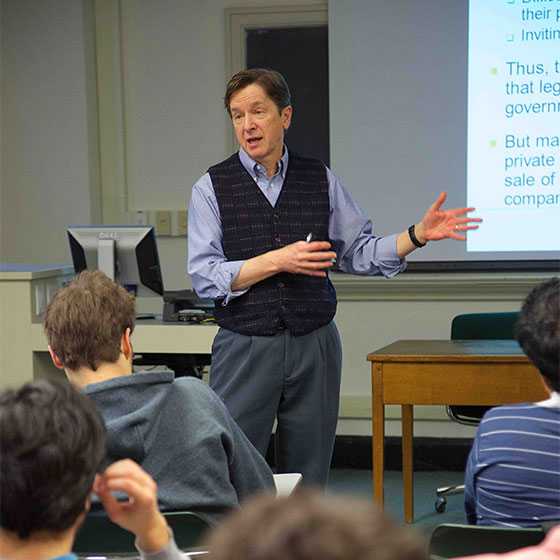Core Courses
The following math and principles of economics courses are required for the B.S. degree in economics. You can choose to take ECN 102 or ECN 203, but not both.
Calculus (MAT 295 & 296)
Students pursuing the B.S. in economics will need to take Calculus I and Calculus II.
Introductory Microeconomics (ECN 101)
You will be introduced to the principles of microeconomics, including consumer demand, theory of production, markets and prices, social welfare and related topics.
Introductory Macroeconomics (ECN 102) OR Economic Ideas and Issues (ECN 203)
Majors can choose between these two courses, which provide a solid foundation into the concepts and methods of economic analysis.
Upper-division Economics Courses
As an economics major, you must completes 27 credits of upper-division economics courses, including the following five courses.
Intermediate Mathematical Macroeconomics (ECN 311)
This mathematically-focused course looks at concepts and tools for the analysis of the behavior of consumers and firms, consumption decisions, market structures, and general equilibrium.
Intermediate Macroeconomics (ECN 302)
You will learn about national product and income concepts, measurements, and relationships; interrelationships of the major segments of the national economy; forces affecting the general level of economic activity.
Mathematical Economics (ECN 505)
This course is an introduction to the use of basic mathematical techniques in economic analysis.
Economic Statistics (ECN 521)
Statistical methods applied to economics is the main focus of this course. Topics include conventional descriptive statistics, conceptual and measurement problems peculiar to economics, analytical statistics, including time-series analysis, elementary theory of probability and statistical inference, correlation and regression analysis.
Econometric Methods (ECN 522)
Students will use statistical procedures in this course, as well as look at problems of estimating parameters in regression models of economic behavior.
Elective Courses in Economics
Economics majors can choose four other upper-division electives in economics. Below are a sample of elective courses you may choose depending on your areas of academic and professional interest.
Economics of Globalization (ECN 367)
You will learn the history of globalization, trends, trade pattern determinants, and more. Other topics explored include protectionism, trade’s impact on labor, poverty, environment etc., foreign direct investment, trade policy formulation, offshoring, fair trade, immigration, and more.
Game Theory and Economic Strategy (ECN 421)
A choice by one economic agent typically affects other economic agents. This course teaches concepts useful in predicting how agents behave in such strategic situations. The focus is on applications in economics and other areas.
International Trade Theory and Policy (ECN 465)
Economic causes and consequences of international trade are explored in this course. Students will learn models of trade, gains from trade, tariffs and other controls on trade, and international institutions guiding the trading systems.
Accelerated Master's Degree Option
The combined B.S. plus master of arts (M.A.) program in economics is designed to allow strong B.S. students the opportunity to earn a high quality STEM-designated M.A. in economics with two additional semesters of study beyond the B.S. degree. The combined B.S. and M.A. program in economics will provide students with sought after skills and valuable credentials that will enhance their opportunities for future employment and possible graduate work.
The credit hours accumulated for the M.A. portion of the combined degree under the plan below are:
- 3 credits for ECN 505 (also counts towards the B.S.)
- 3 credits for ECN 522 (also counts towards the B.S.)
- 6 credits for two 600-level courses taken in the senior year (also count towards the B.S.)
- 9 credits in the fall of the fifth year
- 9 credits in the spring of the fifth year


I am Maxwell.
Everyone is rooting for each other’s success, whether it be from advisors, professors or peers. My advisors pushed me to better myself and my academic career. Had it not been for the Stocks and Finances trip offered through Career Services, I don’t think I would have found out about my summer internship at Morgan Stanley, which led to my current position as an associate in their operations division.”
Leigh-Anne Barreira ’18 Economics, B.S.
Operations Associate, Morgan Stanley